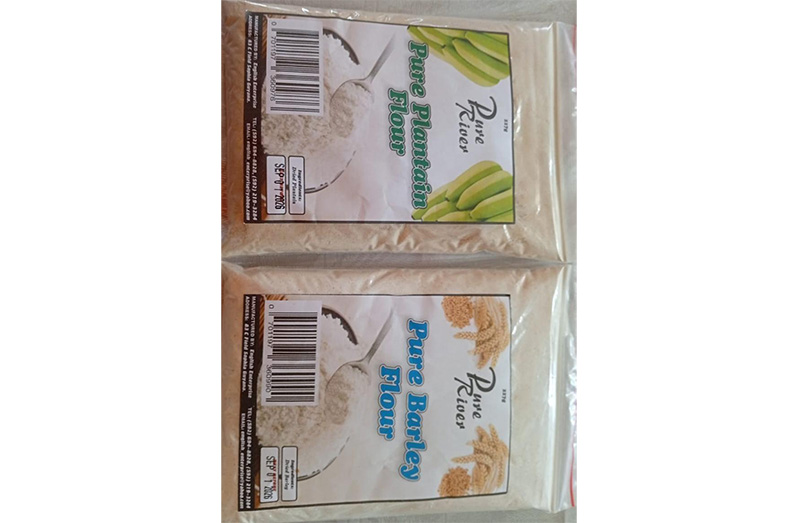NESTLED along the right bank of the picturesque Pomeroon River in Region Two, Hackney Village is home to one of Guyana’s most passionate and visionary beekeepers—41-year-old Amitra Narain. A mother of two and founder of the Pure Rivers honey brand, Narain has devoted her life to preserving and advancing a family tradition that has spanned four generations of dedicated apiarists in the Pomeroon.
For Narain, beekeeping is far more than a livelihood—it is an inheritance of knowledge, discipline, and love for nature. Her great-grandfather, grandfather, and father, Royston English, were all beekeepers, and from a tender age, she absorbed the art and science of caring for bees. She vividly recalls helping her father with the hives, learning the delicate process of honey extraction, and savouring fresh honeycomb straight from the box—her favourite childhood memory.

By sixteen, her exceptional skill and leadership in the field earned her the position of Secretary of the Pomeroon Beekeepers Association, which today boasts thirty-three registered members, including several women. She credits her father’s patient instruction and the strong family bond that encouraged each sibling to learn the craft, though she alone chose to remain deeply involved and turn it into a business.
Today, Narain’s Pure Rivers honey stands out not only for its purity but also for its unique colour and distinct flavour, which she attributes to the positioning of her hives among fruit trees and mangroves in the Pomeroon area. These natural surroundings provide diverse nectar sources that contribute to the rich, layered taste of her honey—qualities that discerning customers across Guyana have come to appreciate.
“It’s real honey from the Pomeroon—no additives, just pure nature,” Narain proudly affirmed. Her Pure Rivers brand is retailed and wholesaled from her home in Hackney and can be found in supermarkets, local shops, and markets throughout Essequibo and beyond. Currently managing five active hives, she plans to expand her operation by an additional twenty boxes by Christmas, with a long-term goal of owning one hundred hives.
The Pomeroon: Guyana’s Pristine Honey Belt
The Pomeroon River region, situated between the Essequibo and Waini Rivers, is often hailed as one of Guyana’s most pristine honey-producing zones. The area’s lush vegetation, abundance of flowering plants, and low pesticide use create an ideal ecosystem for beekeeping. Its mangrove forests and fruit-rich landscapes not only support thriving bee populations but also impart distinctive flavours to the honey produced there. These natural advantages make Pomeroon honey a premium product—highly valued for its purity, texture, and taste.
Narain reminisced that when she was a child, her father would extract as much as ninety-gallon barrels of honey per night during peak seasons. However, environmental changes have since posed challenges. “More lands are being cleared for farming and housing,” she noted. “Even though my hives are located away from intense farming areas, the use of pesticides still affects bees, leading to their death or swarming.” She added that this year’s honey yield has been lower, likely due to reduced rainfall, fewer flowering plants, and prolonged dry conditions.

Empowerment Through Heritage
Despite these challenges, Narain remains unwavering in her commitment. Balancing her role as a mother to two toddlers—ages three and six—with her beekeeping duties, she continues to see the practice as both a legacy and a source of empowerment. “My husband often asks why I chose beekeeping,” she shared with a smile. “For me, it’s more than just an economic activity—it’s love, heritage, and independence. It gives me financial freedom while keeping alive the tradition passed down through generations of my family.”
In addition to beekeeping, Narain is also an agro-processor—producing plantain, barley, and split peas flour—and a self-styled herbalist, crafting natural medicines from indigenous herbs. Her ventures represent a broader movement among Guyanese women who are transforming rural agriculture through innovation and diversification while preserving cultural practices and ecological balance.
The Future of Beekeeping in Guyana
Narain is optimistic about the future of Guyana’s apiculture industry, which she describes as “an untapped giant now being awakened.” She welcomes the government’s renewed interventions through agencies such as the Guyana Livestock Development Authority (GLDA) and the Guyana Food Safety Authority (GFSA) to regulate and strengthen the sector. “Testing honey and establishing laws and standards will go a long way in helping the industry grow both locally and regionally,” she stated.
She also applauds these initiatives for their role in protecting local producers. “Local beekeepers often have to compete with adulterated honey on the market, which undermines the integrity of our genuine brands. With proper regulation and testing, consumers can be assured of quality, and honest beekeepers like myself can thrive.”
Narain’s participation in the GLDA’s Annual Honey Fest has been instrumental in showcasing her brand and connecting with other beekeepers across the country. At last year’s event, she proudly displayed her freshly harvested honey and honeycomb—offering visitors an authentic taste of the Pomeroon. She is once again preparing for Honey Fest 2025, scheduled for October 31 at GLDA’s Compound, Agriculture Road, Triumph, East Coast Demerara, where she plans to highlight not just her products but also the importance of sustainable, authentic honey production in Guyana.
For Amitra Narain, every jar of Pure Rivers honey tells a story of tradition, environmental harmony, and empowerment. From hive to bottle, her journey reflects the enduring spirit of the Pomeroon—pure, resilient, and full of promise for the future of Guyana’s apiculture industry.




.jpg)










